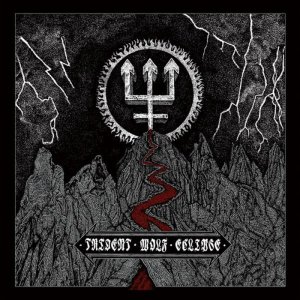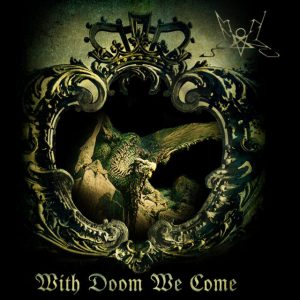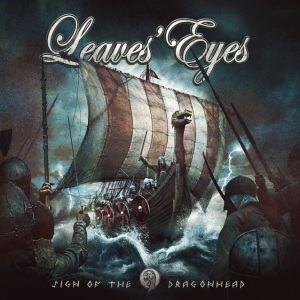I had a vague notion that this year would be front loaded (and maybe back loaded too) with a ton of new noteworthy releases, but this January really has been like none other in recent memory. Most of my time was preoccupied with Orphaned Land’s Unsung Prophets and Dead Messiahs, but the rest was spent trying to catch up on everything else. This is the first part of a series of smaller reviews covering these albums, with hopefully another post covering the rest of them coming soon. In between I have to tackle the mighty triple disc behemoth from Therion so… yeah, that’ll take awhile. There’s a lot of metal to cover and the next few months don’t look like it’ll slow down so I’ll try my best to keep up!
 Watain – Trident Wolf Eclipse:
Watain – Trident Wolf Eclipse:
I had to check to make sure I was getting the date of the last Watain album right —- its really been five years since The Wild Hunt, an album that while largely good, was a bit of a letdown coming after 2010’s viciously earthshaking Lawless Darkness. That’s an album that is seen by many black metal aficionados as something of a recent masterpiece, so it could be argued that The Wild Hunt was never going to live up to the expectations it created (how many bands knock out one masterpiece after another —- seriously though, promotional hype aside?). My problem with it as I recall was that its experimentation fell flat, particularly in their attempts to slow down the tempos more and at one point even try their hand at a road ballad (“They Rode On”). I think it was good of them to try those things, however meandering and at times just boring they ended up. What we and they should be certain of by now is that the Watain sound works better when its this fierce, uptempo ball of fury just barreling forward at full speed with a stop/start tempo change here and there to set things up.
The band returns to this formula for Trident Wolf Eclipse, an album that seems deliberately focused on achieving the spirit of Lawless Darkness, and they almost succeed. What’s holding it back is the thing that made this a really tough album to get into at first, and that’s the strange decision to have this kinda murky, muddy production quality through the whole affair. I had a hard time pinning down this problem at first, but a friend who’s a huge Watain fan pointed it out (“The production sucks!”), and sure enough when you compare this album to their previous outings, there’s a real problem here. It prevents everything from sounding as potent and slicing as it should, and this is a band where you should really feel the riffs on a visceral level. And then there’s just the overall problem that there’s nothing here that stands out, apart from the excellent “Towards the Sanctuary” and opener “Nuclear Alchemy”, two songs that do feel like they were left off Lawless Darkness. Everything else is okay, a fairly consistent barrage of speed and aggression with the occasional slightly slower passage, but there’s little that commands my attention. I’ve gone through this album a fair few times now, and I’m still having trouble deciphering whether its the production that’s keeping things from being too exciting, or that the songwriting just isn’t up to snuff. If its the former, that’s unfortunate but maybe it’ll grow on me in the future —- if its the latter, then we’re still seeing something of a hangover from 2013.
 Summoning – With Doom We Come:
Summoning – With Doom We Come:
I’ve been listening to Summoning for a long, long time —- my first exposure to them was in 2001 when a Tolkien loving friend bought Let Mortal Heroes Sing Your Fame on a whim after inspecting the tracklisting and seeing a bevy of Lord of the Rings references in its song titles (as oddly coincidental as it is that he would stumble upon that album in person, its even stranger that a Summoning album was in a store in Houston, Texas to begin with). The context of this introduction is worth mentioning I feel, because around that time he and I had both undertaken a re-reading of all of Tolkien’s works in preparation for that year’s December release of The Fellowship of the Ring (although, that re-reading had been going on for some time, thanks to Blind Guardian stoking those fires a few years prior). He immersed himself in Summoning’s music and I followed suit, both of us getting copies of their previous album Stronghold and for me at least, having it be background to many a chapter read (and the de facto soundtrack to the hours drained playing Shadowbane aka the greatest MMORPG of all tid).
They were powerful, majestic experiences, and fully formed examples of minimalism in black metal long before the advent of blackgaze or post-black metal. The band was at its best on ‘Mortal Heroes, where they found the perfect balance of golden epic pomp to counteract their ever bleak nature, particularly on “A Distant Flame Before the Sun”, a bleak re-working of the Tolkien/Bilbo Baggins song “I Sit Beside The Fire And Think”. They get close to those moments on With Doom We Come, even though this album largely follows the more subdued and darker tone of 2013’s Old Mornings Dawn. I’m thinking of songs like “Night Fell Behind”, where mournful horns pop up throughout to counteract the sombre singular-note keyboard melody that ambles along at its dreamy pace. Similarly on “Carcharoth”, an interesting mix of keyboard generated orchestral elements are used in juxtaposition to an isolated fragmentary melody to create a mysterious soundscape. Its hard to pull this stuff off convincingly, and Summoning have made a career of doing it. But a few solid moments aside, I wasn’t as enamored with this album as I’d hoped for, large parts of it seem to pass by without me taking much notice (a danger in ambient based music). Seen in retrospect with my lack of enthusiasm for Old Mornings Dawn, and we’re hitting a 14 year drought of something truly excellent from Protector and Silenius. Maybe its time for them to shake things up, to try something bold to re-imagine the Summoning sound.
 Tribulation – Down Below:
Tribulation – Down Below:
I guess I failed to review Tribulation’s 2015 album The Children of the Night, which is weird to realize now considering I listened to it when it came out (new Nightwish and Kamelot albums came out around the same time, so maybe that explains why it slipped through the cracks). Anyway, what that album showed was the sound of this Swedish death metal outfit embracing a blend of goth rock, traditional metal, and psychedelia elements in their already progressive sound. It was a strikingly more song driven album compared to its predecessor, meaning that melodies were front and center to everything as opposed to the riff driven approach of their first two albums. Take that template, and further strip away most of the old death metal tendencies besides vocalist Johannes Andersson’s raw throated vocal approach and you’ll have a good picture of what to expect on Down Below. I’ve seen a lot of comparisons to Ghost being thrown around in regards to this, but that’s a bit of a stretch… Ghost is exuberantly melodic, working with major key melodies like they’re some kind of silky shirted power metal band from Finlandia. I get the spirit of the comparison, buts its waaaaay off.
Now I’ll grant you that Tribulation have upped their production quality, this is as clean and dare I suggest polished as they’ve ever sounded, but their application of melody is still subdued and restrained, used to sketch out the fragments of a song’s skeleton rather than lay things on thick with multi-tracked harmonies and piles of sound. On the album highlight “Nightbound”, its the clean melodic motif on lead guitar that keeps repeating in the background that serves as the actual hook, and its pristine quality allows the rhythm guitar upfront to play a little more relaxed, looser, and grittier. Andersson’s hoarse yet always intelligible vocals careen wildly across, working in tandem with the rhythm guitar in a way that’s half rock n’ roll strut and half goth-metal Nick Cave just going off the rails and ignoring song structure altogether. This is an approach that’s repeated in varying degrees through the album —- there always being something in the way of a simple yet artful melodic figure played with precision to create a sense of structure, and the rest of the band delivering a shimmying, swaying, at times ragged performance around it. On another personal favorite, “The World”, Tribulation unleash a Sentenced-esque sense of musicality, heavy on dark dramatics and major-minor chord shifts to create a sense of the grand and epic. There’s something really charming about this album, about its intentional imperfections and its just right mix of salty and sweet melodic approach that has me coming back again and again.
 In Vain – Currents:
In Vain – Currents:
Norway’s In Vain were on my radar sometime after their 2013 release Ænigma, an album that I never wrote about due to discovering it a year past its release date, but one I ended up listening to quite a bit over the past few years whenever I was in the mood for something proggy yet still hooky and impactful (you’d figure Enslaved would be the go to there but I’ve burnt out quite a few of their albums and others are just too heavy on the prog to satisfy this urge). I just did a guest hosting appearance on an episode of MSRcast’s sister podcast Metal Geeks where I’m fairly certain we referred to these guys as a Finnish band —- a glaring mistake in retrospect because of course they’re from Norway… its written in their musical DNA! Rather than crafting darkly sweetened melo-death with painterly, sweeping guitars ala Insomnium, Omnium Gatherum and their brethren, In Vain display that Norwegian sensibility of progressive death metal heard in fore bearers Enslaved and Borknagar. It means that these songs are at times driven by both riff progressions, and alternately their guitar and/or vocal melodies, sometimes all at once. To add to these bands’ similarities, at times, clean vocalist/keyboardist Sindre Nedlund sounds like a mix of ICS Vortex, Herbrand Larsen, and his brother Lazare (whose Solefald project features In Vain as its backing band). I don’t think as an American metal fan, I’ll ever be able to truly understand just how small and insular the worlds of Norwegian, Finnish, and Swedish metal really are. It just doesn’t work that way here in the States.
On Currents, In Vain certainly place a greater emphasis on clean vocals, but they’ve managed to prevent that from scaling back their heaviness factor, resulting in an album that’s strikingly aggressive and hooky. On “En Forgangen Tid (Times of Yore, Pt II)”, they place a gorgeous Norwegian lyric clean vocal melody over a bed of long sustained guitar figures that remind me of Opeth circa Blackwater Park, the tempo paced at a giant’s march with its doom-laden rhythmic approach. In Vain work well with these types of contrasts, and not all of them are vocal centric: There’s an excellent guitar motif throughout “As The Black Horde Storms”, a song that approaches quasi black metal territory with its near tremolo riffed passages and grim vocals (its possible that this is a guest vocal spot but I can’t confirm it). There is one major confirmed guest vocal drop in however, that being Trivium’s Matt Heafy on “Soul Adventurer”, this guy really making the rounds as of late. I like Heafy generally however, and thought he was quite good on Dragonforce’s last outing and of course he helped make Ihsahn’s “Mass Darkness” into a Metal Pigeon Song of the Year listee. I think he must have a couple different shades to his vocal approach because he’s hitting a lower register than I’m used to here (I’m not all too familiar with the spectrum of his work in Trivium). The result is pretty good, nothing I’m freaking out about —- its like hearing an Americanized version of Vintersorg, and to say its unusual is a fair appraisal I think. Time will tell if I wind up listening to this as much as its predecessor, but its made a strong impression overall.
 Leaves Eyes – Sign of the Dragonhead:
Leaves Eyes – Sign of the Dragonhead:
Its been over two years since the last time we had new music from Leaves Eyes —- in that time Liv Kristine and Alexander Krull had a very acrimonious and public divorce/fall-out, and the band went on the road with newly recruited Finnish vocalist Elina Siirala. I’m pretty sure I’m remembering this right, but I saw the band two times with her at the helm between then and now, the band opening a few North American tours for others as a way to not only introduce Siirala to their fans, but also perhaps test out the waters before committing to a recording. I know that I at least mentioned it on the MSRcast, if not in writing here on the blog, but I walked away from those shows rather unimpressed with Siirala within the greater context of the band. I had seen Leaves Eyes with Liv way back in 2007 opening for Kamelot, and she was magnificent that night, her delicate, graceful, downright elegant stage performance winning me over. I still wasn’t too wild on their albums (the Vinland Saga the exception) but I could at least say that they were able to translate to the stage what they were trying to accomplish live. Maybe things will change on future tours, but Siirala seemed out of place onstage, or perhaps it was that she was so strikingly different from Liv and I had a hard time accepting that.
As a vocalist however, Siirala has a strong, rich, almost Tarja-esque vocal ability, and she can siren it out live. And that’s the most striking thing about Sign of the Dragonhead, that she delivers the most forceful, pronounced, and strident lead vocal performance heard on any Leaves Eyes album period. Case in point is the opening title track, a slice of strut and stomp symphonic metal that’s about as meat and potatoes as this genre gets, but it boasts a pretty strong hook. Her voice is noticeably without accent, a rarity for a Finnish singer, but apparently she lives in London and you have to wonder if that’s been a factor in changing her voice to something that is very Euro-neutral. On the gentle, folk-instrument accompanied ballad “Fairer Than The Sun”, she delivers a command performance, controlled and precise, and what it might lack in distinct character, it makes up for in sheer strength. Another highlight is the weirdly different “Riders On the Wind”, where I’m hearing a folky-rockin’ vibe unlike anything I’ve heard from the band before. I had to double check to make sure it wasn’t an old Jethro Tull cover or something like that, and I wish the band would try to spread their wings a bit more like this and get adventurous. It works here, and “Riders” and the folk-laden “Winter Nights” are stark contrasts to nearly everything else on offer, which is largely more of the same. There’s nothing wrong per say with cuts like “Across the Sea” and “Jomsborg”, but it just feels like we’ve heard their kind before. A promising start with a new vocalist, but hopefully just a stepping stone to something greater.

February 13, 2018
As a singer, I’m somewhat baffled by your apparent decision to consider an accent a part of the voice. It’s a bit like considering a pick to be part of a guitar.
February 13, 2018
I think an accent is most definitely part of a singer’s voice or vocal approach. Sometimes it’s part of the charm or one of the reasons you can’t get into a particular vocalist. I’ve had a metal friend who couldn’t get into a guy like Timo Kotipelto purely because of the way he’d accent certain words. I myself found certain Tarja-isms hard to handle on some Nightwish songs —- she’s clearly a wonderful singer but sometimes it popped up. Conversely, I love the way guys like Tony Kakko and Klause Meine have distinctive ways of pronouncing specific words.
February 14, 2018
“Vocal approach” maybe, but definitely not part of the _voice_.
The voice is an instrument, it’s a given (there’s only so much you can change through training – exactly like playing a guitar, a Fender won’t sound like a Gibson however well you play).
Accent is mouldable. Even people who never really had professional instruction in a foreign language (which includes many hours of phonetic drills) but didn’t completely fail their high school classes are generally able to incorporate more or less of their native accent on demand (and even copycat accents of unknown languages sometimes).
Same as you can change your pick gauge on the fly to vary the sound somewhat.
You could say I’m nitpicking, and maybe I am in the eyes of the general public, but as a singer, I do take it somewhat personal that the majority of metal fans – and, by extension, reviewers – are not exactly well-versed in singing mechanics and the like, while being able to pick up (gotta love phrasal verbs!) by ear a lot of detail concerning guitars.
February 14, 2018
I see your point, but if someone’s singing voice is affected by their environmental situation (say in having English as a second la language), it’s noticeable even in their speaking voice let alone their singing voice. It’s not their choice, it’s just the way they sound. Most metal vocalists are untrained and just performing naturally. Their accents come through despite most efforts to prevent them.
I was born here in the States, and my mom wasn’t. We’ve both lived here for decades but while I sound like a typical American she cannot despite having decades more time to adjust. Accents are mouldable sure, but as you said there’s a limit, one reinforced by location, culture, etc.
I think it’s easier for Brits to sound more American (Gavin Rossdale comes to mind) or rather, less British as they sing —- but at least in my experience most European/Scandinavian vocalists have something distinct in their delivery and phrasing that can only be best described as an accent. Nothing that’s their fault, but something I hear in their voice that’s beyond their control.
February 14, 2018
I’m not arguing against the fact that most non-native speakers (of any language) butcher its phonetics to a certain extent, willingly/knowingly or not. People do have accents.
But the voice per se cannot have an accent. A person can. Speech can be accented. But not voice.
There are far fewer limits to moulding an accent – think of spies. They are trained to speak identically to a native, or their cover is blown. It doesn’t go against physiology – it’s like adopting different fighting stances for different martial arts. Not easy: needs dedicated conscious effort over a significant period of time, but – possible.
And phrasing in the musical sense isn’t really about accent in the language sense. The word “articulation” in music means how long and/or loud the notes are, legato or not, that sort of thing. A musical phrase remains the same, whether sung with words, without words or played on an instrument with comparable articulation capabilities (like a violin).
PS Most non-anglophone metal musicians aren’t trained beyond high school in the sense of second language acquisition – it’s true and extremely unfortunate. Though since native speakers don’t seem to view fifth grade pronunciation and grammar mistakes as disrespectful, I guess even those who have enough money to hire a private teacher will keep on refraining from doing so.
February 15, 2018
I absolutely love that Tribulation album. I haven’t heard gothic metal that sounds like…well, a genuine mix of gothic rock and heavy metal in a while (though there was that Beseech reunion album last year). Some if it honestly reminds me of Bauhaus with a more metal flair and I’m totally into it. I’d say I prefer their two latest albums over their earlier ones. Oops… I still haven’t given the new Summoning album a listen, but I remember really liking “Old Morning’s Dawn”.
And as someone that enjoys every previous Leaves’ Eyes album, the newest one doesn’t do a whole hell of a lot for me. I like the song “Riders on the Wind” for pretty much the same reasons you do (it’s something different for them, more power metal, and it works!) but most of it comes off as a noticeably weaker “King of Kings”. I also get absolutely nothing out of Elina Siirala’s voice – she doesn’t really project much emotion. I’m aware Liv Kristine didn’t have a big voice exactly (she had a light, airy tone) but you could detect emotion in her singing. I would agree that she’s not gelling well with the rest of Leaves’ Eyes – Liv Kristine and Alexander Krull had much better chemistry together, it’s a shame things ended so roughly between them (and for all the public to see).